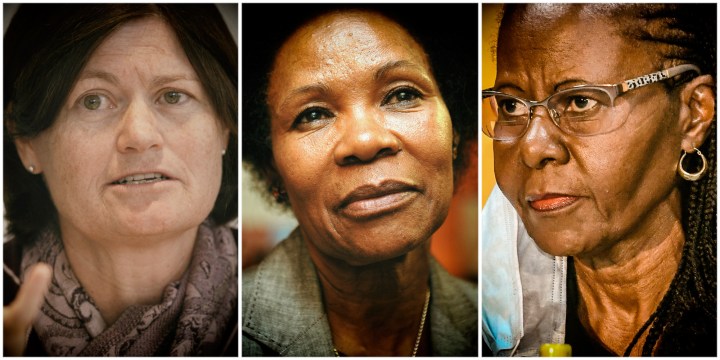JUDICIARY OP-ED
The appointment of female judges to superior courts is not a favour to women — it’s a favour to justice

The presence of women is vital to any country’s judiciary. It goes way beyond adhering to laws and has a profound societal impact.
The Judicial Service Commission (JSC) has recently provided President Cyril Ramaphosa with a shortlist of candidates for vacant positions at the Constitutional Court. Noticeable on the current list are two women judges who were previously overlooked for these posts, despite support from the JSC and the public.
The president must acknowledge that including women in the judiciary is not an act of benevolence — far from it. The presence of women is vital to any country’s judiciary. It goes way beyond adhering to laws and has a profound societal impact.
The demographics of a country should be reflected in its judiciary. If the judiciary is seen as a bastion of entrenched elitism, exclusivity and privilege, ignorant to changes in society and the needs of the disadvantaged, it will be distrusted.
One could take this a step further and state that the presence of black women judges is vital given our racist and patriarchal past wherein women, especially black women, found it extremely difficult to secure a seat on the bench of any court in our country. Transformation is not only essential to achieving the country’s goals, but is paramount in ensuring that the majority of the people who rightfully had a distrust of the largely white male judiciary begin to build trust in the judicial system.
Justice Vanessa Ruiz of the United States Appeal Court in the District of Columbia, in an address to the United Nations, maintained that people will find it difficult to accept the judiciary’s legitimacy as the guarantor of law and human rights if the court itself acts in a discriminatory manner by enforcing existing patriarchal practices.
Our goal should be to attain equal representation for women judges at all levels of the judiciary, not just because it is the right thing to do, but also because it is apt for a more just rule of law. Women judges help to improve the judiciary and the public’s confidence in their presence alone sends a powerful signal that the judiciary is open and accessible to those who seek recourse to justice.
Expert sounds alarm on fifth wave after Covid-19 curve turns upwards in SA
Jurisprudence
Furthermore, women judges contribute substantially to the quality of jurisprudence produced in the courts. If certain members of society are excluded from contributing to jurisprudence, then the quality of the case law will be lacking and thus compromised. Needless to say, women judges deserve to be at the table because they have earned the right to be at the table; they have the necessary skills, credentials and experience in the same manner as their male counterparts.
In countries such as Kenya, it has become evident that as a court’s makeup becomes more diverse, conventional practices become less established and the jurisprudence improves. Outdated anti-women laws, particularly with respect to marital property regimes and inheritance, have improved with gender parity and equality. Indeed, the inclusion of women judges in the South African judiciary has already had a profound impact on our jurisprudence.
Justice Yvonne Mokgoro was South Africa’s first black woman justice of the Constitutional Court. In Khosa and Others v Minister of Social Development, Mokgoro penned the majority judgment which stated that the Constitution vests the right to social security in everyone and thus gave permanent residents the ability to apply for and receive grants in terms of the Social Assistance Act.
Later, in Volks v Robinson, she and the only other woman on the bench, Justice Kate O’Regan, wrote a dissenting judgment regarding a maintenance claim in terms of the Maintenance of Surviving Spouses Act, which Mrs Robinson was excluded from due to her marital status. They emphasised that the Constitution prohibits unfair discrimination on the grounds of marital status.
This position has now been confirmed and vindicated by the Constitutional Court at the end of 2021 in the judgment Bwanya v The Master of the High Court.
Discriminatory harm
Another recent ruling in Tshabalala v S illustrates the value of holding some of the highest offices in the judiciary. Justice Sisi Khampepe’s concurring judgment speaks to the intersectionality of discriminatory harm against black women. She opens her judgment with a quote from African American author Alice Walker and asks the reader: “Who knows what the black woman thinks of rape? Who has asked her? Who cares?”
Conversely, a lack of female judges may subconsciously communicate that women are unfit to hold high leadership positions in society, such as in the judiciary. The most recent judiciary annual report states about 44% of judges in the superior courts are women. Women do not, however, occupy top positions in the judiciary. Only three full-time justices currently at the Constitutional Court are women and there has been no woman Chief Justice in the 26 years since the establishment of the court.
Indeed, out of the 14 heads of superior courts in South Africa, only three are women, which is genuinely appalling. This includes the judge presidents of the high courts, the president of the SCA and the Chief Justice.
If the South African judiciary wishes to gain trust from the public, it has to be an accurate representation of the country’s demographics. There is no excuse in 2022 to have only one fifth of the heads of our superior courts filled by women. The JSC has shortlisted qualified women judges for positions in the Constitutional Court and there is no legitimate excuse for not hiring them. The legitimacy of the judiciary depends on it. DM
Thandeka Kathi, Sithuthukile Mkhize and Zanele Malindi are based at the Centre for Applied Legal Studies, Wits University.


















Comments - Please login in order to comment.